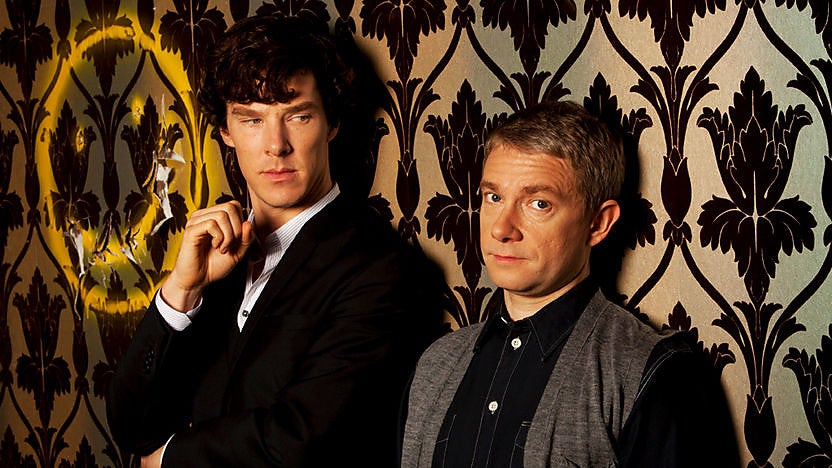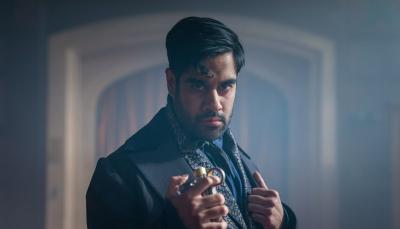'Sherlock' Series 2 Continues, Or, Why 'The Hounds of Baskerville' is My Favorite S2 Episode

To be fair, Hounds is not technically the best episode of Series 2 – that honor belongs to series finale The Reichenbach Fall and the subsequent intense emotional devastation it causes – but it is, hands down, my favorite, precisely because it manages to do so many things at once: terrify you, impress you, and make you really feel for the characters. It’s frightening, it’s clever, it’s a believable modern update of the Conan Doyle story that general audiences are most familiar with, it’s funny, and it’s full of really wonderful character development too. (I adore it so much!) Reichenbach is a better episode, probably the best the show's ever done, but Hounds is the one I can come back to over and over without the need for therapy or loads of Kleenex.
Why?
It’s genuinely scary. This episode was written by co-creator Mark Gatiss, who did last season’s finale The Great Game, and who has a tremendous gift for subtlety, language and mood. Gatiss also has a wonderfully deft hand for handling stories about horror, as we’ve seen before in Game and several of his other, non-Sherlock-related works, like the History of Horror series and that Doctor Who episode with the creepy dolls (Night Terrors) that gave me nightmares.
This episode is genuinely frightening – wonderfully tense and dark and something you should probably watch with the lights off at some point just for the experience. The dark treks through the forest, the creepy fog, the steadily increasing tension, everything all combines to something that feels like a horror movie, but one that could happen in real life. Interestingly enough – for me, the scariest moment was actually watching John’s visceral fear while hiding in a cage at the Baskerville laboratory. No dog present and, as it turns out, no actual danger at all, yet it’s still possible to end up clutching your nearest pillow or stuffed animal and hoping that someone gets there ASAP to save the day for him. (And, really, Sherlock, you jerk.).
It would have been even lovelier had they never felt the need to “show” us the dog at the end – I suppose viewers are meant to see it as though we too have been trapped in the hallucinogenic fog ourselves, but the special effects were…a bit on the dodgy side, and quite honestly, this story works better when you imagine the hound you would see, rather than look at the one the special effects people managed to come up with.
It’s a wonderful character study. This episode handles Sherlock’s emotional state/development a bit more deftly and clearly than “Belgravia” does in a somewhat similar situation. Perhaps it’s because the relationship between Sherlock and Irene – and Sherlock and almost everyone else except John – is left largely ambiguous, it’s harder to get a read on what sort of emotional growth he may experience when it comes to the whole “caring is not an advantage” business. (We all already know that Sherlock cares about things, but he triumphs over Irene precisely because he is able to care…less? Not sure what our takeaway from “Belgravia” is supposed to be in that instance, and thinking about it gives me a headache, so, moving on.)
Thankfully, this episode is very focused on Sherlock himself, and not so much about how Sherlock relates to other people (though, obviously, tangentially, that does matter). It’s about how Sherlock sees himself – his total meltdown by the fireplace at the inn is because he can’t handle a scenario where he’s affected by things (fear, etc) like normal, “average” people, thus his completely unnecessary cruelty toward John and his epic mega-deduction rant to prove that “there’s nothing wrong” with him. (Honestly, that “I don’t have friends” line. It makes me want to hug Sherlock to utter death, even though he would obviously not see the need for it.)
For me, this episode much more realistically depicts a Sherlock that’s in a spiral of self-doubt and fear, and does a much better job of showing Sherlock getting out of it, as opposed to “Belgravia” which sort of dumps his emotional upheaval on the floor and pokes it, but doesn’t really take it anywhere. What “Hounds” does so well is give Sherlock an actual chance for growth. He realizes that he went too far, apologizes to John – repeatedly – actually verbalizes what John means to him and does, in his own Sherlockian way that actually involves drugging his best friend at the same time, try to make it up to him. The bit where Sherlock calls John a conductor of light kills me. It’s so perfect. Tangentially, I think it’s interesting that so many of the compliments that Sherlock pays John during his apology spiel are things that he’s learned from John – the you’re amazings and fantastics and brilliants are all things John’s said to him many times. It’s probably why the “conductor of light” bit is so affecting, because it’s such a purely Sherlockian phrasing and obviously the one thing he came up with on his own.
Perhaps it’s because in this instance, Sherlock isn’t actually facing off with another person, but rather an idea, so to speak, that the fact that he ultimately solves the puzzle doesn’t negate his experiences that came before it. There’s no mutant dog racing through the forest, but the fear and self-doubt was very real, for him, and is something we’ll see again next episode.
It’s got fantastic Sherlock and John moments. While all the mysteries and clever quips and rapid fire-deduction monologues are all wonderful parts of this show, honestly, Sherlock lives and dies on the Sherlock and John relationship and whether or not it’s believable and emotionally affecting. And that statement is probably double true for this episode – it works because of the character stuff going on alongside the mystery, less so than the actual mystery iteslf. I could go on for many paragraphs about all the reasons that Benedict Cumberbatch and Martin Freeman are the best duo on television today, but y’all have heard all that before. But they really, really are. And this episode, more so than any other except possibly A Study in Pink, gives us a great look at the Sherlock/John friendship, how they work together, and what they mean to one another.
John makes Sherlock a better person. Not a good person, necessarily, but better than he would be without him. The endearingly awkward morning after scene following their fireplace fight where Sherlock tries small talk and work talk and everything in between before finally admitting that he’s sorry and that John’s the only real friend he has, is pretty much perfect. Sherlock is obviously loathe to admit it – as he is about anything that could possibly indicate that he has an emotional reaction to something – but he clearly values and appreciates John’s friendship, and actually feels bad that he was such a jerk, feels bad solely for John’s sake, and not so much because he has something to gain from it.
Sherlock, of course, can’t even apologize without an ulterior motive, because he even when he’s making John an “I’m Really Sorry” Cup of Coffee, it’s got possibly hallucinogenic drugs in it. (Because, why wouldn’t it?) And John is absolutely the best person ever, because he not only doesn’t punch Sherlock in the face after he finds out he was purposefully drugged so his best friend could test a theory – he’s actually more thrilled that Sherlock was wrong and that he gets to rub his face in that fact. They are amazing.
It features Sherlock at both his most unlikeable and his most human. In the same episode we see Sherlock at his most vulnerable – the moment when he angrily admits that he felt afraid in the forest is incredibly moving and amazingly acted – we also see Sherlock at his most selfish and cruel. We learn that he purposefully drugged his best friend – the only friend he had by his own admission – for a case, put his feet up on a desk and watched him hide in a darkened room afraid for his life. John, being an incredible person, forgives Sherlock for this easily (possibly too easily?) but it’s really a fantastic example of all the ways that Sherlock is not okay, is not normal, and is a very uncomfortable model for a hero. (He is a hero, to be sure, but one that obviously comes with a disturbing amount of warts.)
I’ve said this before, I’m sure, but one of the absolute best things about this Holmes adaptation is its commitment to the fact that Sherlock is generally not a nice person, is not a heroic ideal, and is probably not even someone you’d want to hang out with most of the time. That he’s also brilliant and heroic and selfless and wonderful in a lot of strange ways is also true, but it doesn’t negate the other less-than-fantastic aspects of his personality. He’s realistically flawed. Far too many television shows – let along Holmes adaptations – are afraid to let their leads be horrible people as much as they are great ones. This one’s not, and Sherlock is ever so much more interesting for it.
Other highlights of this episode include:
Domestic Life at 221b Baker Street. If a miracle happened and we were suddenly gifted with 12 or 13 episodes of this series a year (can you imagine?), one of the things that I would give anything to see is an entire episode that’s just about Sherlock and John puttering around 221b and doing whatever it is that they do on an average Thursday. I would give anything to see a flashback to that Cluedo game John describes at the beginning of this episode and Sherlock’s attempts to argue that the victim actually killed themselves. (Also, I expect this explains why that Cluedo board was jackknifed to the fireplace mantle in “Belgravia”?)
It’s stunning, really, when you think that at this point this is only the fifth episode of this show in existence, yet Cumberbatch and Freeman manage to convey volumes about the little ways that Sherlock and John have learned to read each other and navigate all the little minefields of living together. There’s such a fantastic feeling of depth to their relationship – it’s so easy to believe that they keep having loads of adventures when we’re not watching them, because they act like people who do.
Driving in Cars with Sherlock: When I first saw this episode, I found it so strange that Sherlock drives the boys’ car in Dartmoor. Driving always struck me as the sort of pedestrian normal people activity that Sherlock would disdain and immediately delete – if he ever even knew how. But, apparently, Sherlock had to drive, as John couldn't – because Martin Freeman doesn’t know how. This bit of behind-the-scenes life bleeding into the on-screen story made me giggle for a good long while when I read it.
Lestrade Has a First Name! The scene where it’s revealed that Lestrade’s first name is Greg – which Sherlock of course doesn’t know, nor immediately believe – was hilarious.
Sherlock Has a Mind Palace! While the visuals depicting Sherlock’s trip through his “mind palace” are a bit strange – really, it’s the shot of Elvis’ face and “Hound Dog” that I can’t seem to get past – the concept is so perfect. Ever since The Great Game when Sherlock describes information as something that he deletes from his hard drive if it’s not immediately relevant to the work, I’ve pretty much had a mental picture of Sherlock’s brain as a giant database, kind of like Google. This is one of those moments that – other than actually referring to his brain as Google – that was basically exactly how I’d thought it up in my head and it’s pretty much perfect.
From what I’ve read around the web in recent weeks/months, there are a lot of split opinions about Hounds, particularly as regards its comparative quality to Belgravia and Reichenbach. I wonder if that has to do with the fact that this is the Conan Doyle story most people actually know – so the ending’s not a surprise; though honestly I do find the possibility of hallucinogenic military drugs at least as plausible as a dog covered in phosphorus. Still, all things considered, I found this a credible update of a story that isn’t a personal favorite of mine, and definitely one of those the journey’s better than the ultimate destination kind of things. (The resolution to this story in canon is a bit of a let down, too, if you ask me.)
Time to start stockpiling supplies for the finale next week!




